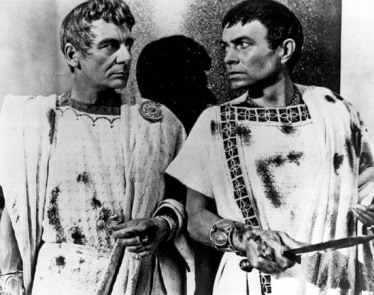
 Joseph Mankiewicz’s 1953 version of Julius Caesar, starring James Mason, John Gielgud, and Marlon Brando, is one of the few Hollywood renderings of Shakespeare that works.
Joseph Mankiewicz’s 1953 version of Julius Caesar, starring James Mason, John Gielgud, and Marlon Brando, is one of the few Hollywood renderings of Shakespeare that works.
Hollywood has had a rather dismal record adapting Shakespeare to the screen, but one of the few happy exceptions to this was Joseph Mankiewicz’s 1953 version of Julius Caesar. For those unfamiliar with the play, it concerns the decision by two noble Romans, Brutus and Cassius, to assassinate Caesar because the popular general is about to declare himself dictator, which would end the Roman republic. After the deed is done, Caesar’s young ally Marc Antony turns the city against the conspirators and the stage is set for a fight to the death with the future of Rome at stake.
A large part of this version’s success is due to the brilliant casting. James Mason is a splendid Brutus, with his rich and measured demeanor and his distinctive voice, bringing the nobility and impractical idealism of Shakespeare’s conception to life. It’s a performance that continues to build as the film progresses, climaxing with the extremely moving scenes on the eve of the battle of Philippi. This all may not have been enough, however, without the great balancing effect of John Gielgud as Cassius, a figure who might seem merely sinister at first glance but is rounded out and given full scope through that great English actor’s energy and passion.
Then there’s Marlon Brando. The decision to cast him as Marc Antony was controversial at the time because critics associated him with a different sort of drama, but as it turns out, he’s wonderful in the part and couldn’t have posed a sharper contrast to Mason’s and Gielgud’s characters, which is just what is needed from an Antony. If there is a weak point, it’s Louis Calhern as Caesar: at times he seems too much the smooth American type to be credited as the conqueror of Gaul, but this is a minor point—the performance never grates on you. Mankiewicz has kept all his actors within the bounds of a wise restraint.
He also displays both understanding and respect for the material. Mankiewicz knew that Shakespeare’s scenery and action must always play a strictly subservient role to Shakespeare’s words. The art direction and the sets are simple, almost abstract, convincing enough to be ancient Rome, but never distracting. The words are spoken clearly so that we can comprehend them—this seems a simple enough requirement, but it’s amazing how often it’s not fulfilled in presentations of Shakespeare on stage or screen. The picture manages to convey a sense of foreboding and doom with quiet conviction, a few minimal visual effects, and the judicious use of Miklos Rozsa’s musical score.
Those who don’t bother to delve below the surface of the tragedy may be forgiven for thinking that Julius Caesar is its hero, when the fact is, the play might better have been titled “Marcus Brutus.” The tragedy of Brutus is that of a man who loves his country so much that he’s willing to assassinate a friend in order to prevent dictatorship. Where someone without scruples, like Antony, might have succeeded in this enterprise, Brutus’s integrity and generous spirit prove to be his undoing. In my view, it’s one of Shakespeare’s deepest ideas, and it’s a tribute to the great intelligence and skill of Joe Mankiewicz that this is realized clearly on screen.
Julius Caesar is available on DVD.

